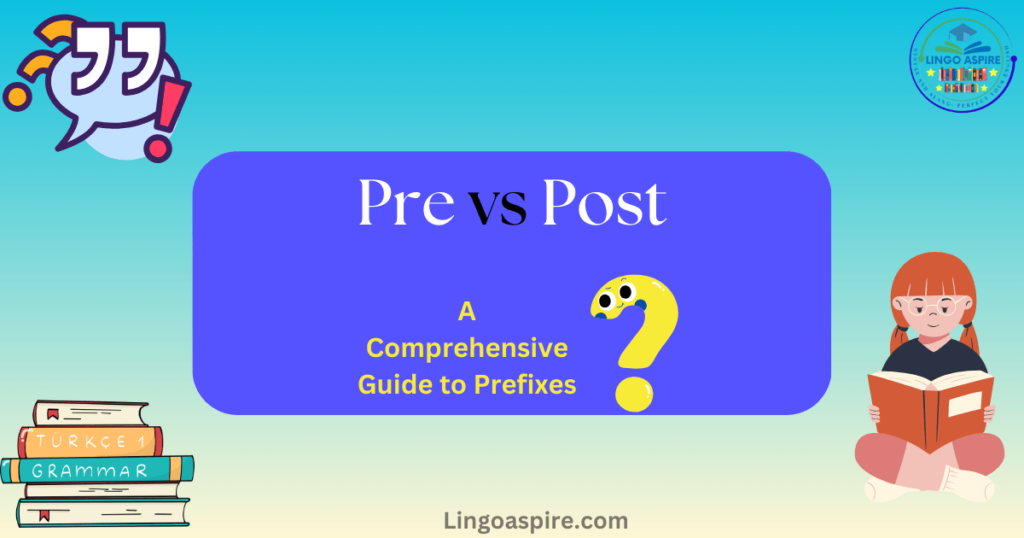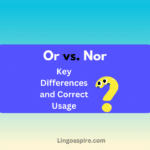When you’re learning English, prefixes like Pre vs Post can seem simple. However, understanding their usage and differences is important to mastering the language. Pre and post are prefixes that indicate time, but knowing when to use each can be confusing for many. This guide will explain pre-post in-depth, helping you understand when and how to use these two prefixes.
What Are Pre vs Post? Their Definitions

Pre is a prefix that means “before.” It comes from Latin and indicates something happening earlier than a specific point in time. On the other hand, post means “after.” It also has its roots in Latin and refers to something occurring later or following an event.
For example, when you pre-order a book, you are reserving it before it is released. Similarly, if you talk about post-surgery care, you refer to the actions taken after a surgical procedure. The difference between pre vs post lies in their use to show the timing of events relative to one another.
The Key Difference Between Pre vs Post
The key difference between pre and post is their indication of time. Pre refers to actions or events that happen before something else, while post refers to actions that happen after an event.
For instance, when you pre-enroll in a class, you are signing up before the class starts. In contrast, post-mortem refers to an analysis or review of an event that happens after someone has passed away. This shows how both prefixes serve to frame time but in opposite directions.
The Origins of Pre and Post
Both pre and post-have origins in Latin. Pre comes from the Latin word “prae,” meaning “before,” while post comes from “post,” which simply means “after.” These prefixes have been in the English language for centuries and are widely used today in everyday speech and writing.
Understanding their historical roots helps solidify their usage. For example, in ancient Rome, pre was used to describe actions taken before an event, while post described actions taken afterward. Their meanings have remained largely unchanged, even as the language evolved.
When to Use Pre vs. Post
Knowing when to use pre- or post can be tricky. Pre is often used for things that happen before a major event or action. For instance, pre-interview preparation refers to the work done before an interview. Pre-requisites are conditions or courses required before you can move forward with a particular task or job.
In contrast, post is used for events or actions that happen after something. A post-surgery appointment happens after surgery, just as a post-party cleanup happens after the event. When choosing pre vs post, remember that pre is all about what comes first, while post deals with what happens afterward.
The Importance of Using Pre and Post-Correctly
Using pre- and post correctly can make your communication clearer and more precise. For example, in professional settings, saying you need to pre-order an item shows you’re getting it in advance while saying post-surgery care emphasizes actions taken after an operation. Using the wrong prefix could lead to misunderstandings about timing, which is why it’s important to grasp the difference pre vs post.
For a freelance writer, using these prefixes correctly can improve the quality of your writing. Whether you’re writing a blog post or offering writing jobs to clients, clarity is key. A well-structured sentence that properly uses pre or post can help you convey your ideas more effectively.
Pre in Everyday Life: Practical Uses
The prefix pre is often seen in everyday language. It helps us talk about things that happen before an event or process. For example, before you attend a job interview, you might pre-enroll for the interview preparation course. Similarly, when cooking, you might need to pre-heat the oven before you can bake anything.
Words like pre-order, pre-requisites, and pre-determined are used regularly in various contexts. In education, prerequisites are courses or requirements that must be completed before you can take more advanced classes. Understanding how to use pre makes it easier to talk about things that come before something else, providing clarity to your sentences.
Post in Everyday Life: Practical Uses
On the other hand, a post is used when discussing something that occurs after a particular event. You might have heard of post-mortem analysis, which is an evaluation done after a significant event, such as a tragedy. After attending an event, you may participate in a post-party cleanup. In professional contexts, there are also post-interview reviews, where the interviewers discuss candidates after the interview process.
In the medical field, post-surgery care is essential for the recovery process. This term refers to everything that happens after surgery to ensure proper healing. Whether in medicine, business, or casual conversations, knowing when to use posts helps you communicate the timing of events.
Common Confusions: Can Pre and Post Be Used Together?
While pre and post are often used separately, there are cases where both can be used in the same sentence. For example, a pre-interview discussion might happen before the actual post-interview analysis. Both prefixes can relate to different points in time but within the same larger event.
It’s important to remember that although pre and post-may seem interchangeable, their timing is not. They frame different periods: one focuses on what happens before, and the other, after.
Origins of ‘Pre vs Post’
The prefixes pre and post both have deep roots in the Latin language. Their usage in English comes from the Latin words “pre” and “post,” which respectively mean “before” and “after.” These prefixes have been around for centuries, shaping the way we structure and communicate ideas involving time.
In Latin, pre was used to indicate that something happened before a particular point or event. Similarly, a post was used to describe something that occurred after an event had taken place. These simple but powerful words have been adopted into many languages, including English, and have maintained their original meanings over time.
The influence of these Latin roots is still evident today. In English, we often use pre and post in a wide range of contexts, from pre-ordering tickets to discussing post-mortem analyses. Understanding their origins helps us appreciate their importance in English grammar and how they shape the way we talk about time and sequence.
In modern English, pre is often associated with words like pre-determined, pre-enroll, pre-surgery, pre-interview, and pre-requisite, all of which relate to events or actions that take place before something else. Similarly, post is used in terms such as post-event, post-workout, post-surgery, and post-mortem, which deal with things that happen after an event or action has occurred.
Both prefixes are simple yet powerful in their ability to convey timing and sequence, allowing us to articulate the relationship between events in a clear and precise manner. Whether you’re talking about pre-enrollment for classes or post-surgery recovery, these prefixes guide the listener or reader in understanding when things occur relative to one another.
Synonyms and Alternatives to Pre and Post
There are several synonyms and alternatives for pre and post, although they often serve slightly different functions. For example, instead of using pre, you could say before, ahead of, or in advance of. These alternatives all express a sense of timing before an event.
For posts, alternatives like after, after, or following can be used. These synonyms may fit better in specific contexts. For example, instead of saying post-surgery, you could say following surgery or after surgery. The right choice depends on your sentence structure and the tone you want to achieve.
Pronunciation of Pre vs. Post
When pronouncing pre and post-, the difference is clear. Pre is pronounced like “free,” while post is pronounced like “post.” Despite their simple nature, proper pronunciation is essential to ensure clarity. This is particularly true in professional settings, where speaking clearly and confidently can impact the effectiveness of your communication.
Sample Sentences Using Pre and Post
Understanding pre vs post becomes easier when you see the words in action. Here are a few sample sentences pre- vs. post to help illustrate their proper use:
- Pre:
- I need to pre-order my tickets for the concert.
- She had to pre-enroll for the course before the semester started.
- The chef asked me to pre-heat the oven before I added the batter.
- Post:
- After the event, we had a post-party cleanup.
- The doctor will give you post-surgery instructions for recovery.
- He scheduled a post-interview meeting to discuss the candidate’s performance.
These examples show how both prefixes shape the meaning of a sentence by indicating when something happens about another event.
Common Uses of Pre and Post-Prefixes

Here’s a table summarizing some common uses of the pre and post-prefixes, highlighting their applications in everyday language:
| Prefix | Example | Meaning | Use Case |
|---|---|---|---|
| Pre | Pre-order | To order something before it is available | Pre-order tickets or a new book |
| Pre | Pre-enroll | To register or sign up before something begins | Pre-enroll in a class or program |
| Pre | Pre-interview | Preparation or discussion before a formal interview | Pre-interview research or questions |
| Pre | Pre-requisite | A requirement that must be completed before moving forward | Completing pre-requisite courses for a degree |
| Pre | Pre-heat | To heat an oven or appliance before using it | Pre-heat the oven before baking |
| Post | Post-surgery | Actions or care taken after a surgical procedure | Post-surgery recovery, follow-up appointments |
| Post | Post-mortem | An analysis or investigation after an event or death | Post-mortem report of an incident |
| Post | Post-event | Refers to activities happening after an event | Post-event gathering or cleanup |
| Post | Post-workout | Refers to the time or care taken after exercise | Post-workout stretching, protein shakes |
| Post | Post-party | Cleanup or activities happening after a party | Post-party cleanup and reflection |
Conclusion
In conclusion, the difference between pre and post is clear once you understand their meanings and uses. Pre refers to anything that happens before an event, while post refers to anything that happens afterward. Both prefixes are widely used in everyday language and professional settings, from pre-ordering to post-surgery care.
As you continue learning English, keep in mind the importance of these two prefixes. Using them correctly will not only make your speech clearer but also make your writing more precise. Whether you’re a freelance writer working on a blog post or preparing for an interview, mastering pre and post will help you communicate more effectively. So, next time you encounter pre or post, you’ll know exactly how to use them to enhance your communication.
Sources
Online Etymology Dictionary: This resource provides comprehensive etymologies of English words, including the prefixes pre and post. It traces their Latin roots and offers insights into their historical usage.
Oxford English Dictionary (OED): The OED offers detailed definitions and etymologies of English words. It includes information on the prefixes pre and post-, highlighting their Latin origins and evolution in the English language.
Merriam-Webster Dictionary: Merriam-Webster provides definitions and the etymology of words, including the prefixes pre and post. It explains their meanings and origins, helping readers understand their usage in modern English.







